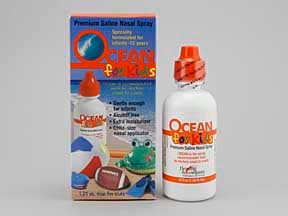
Ocean For Kids Coupons & Savings Card – Discount Prices from $4.70
My prescription
Edit
37.5ML of 0.65%, Ocean For Kids (1 Bottle)
Select pharmacy

Walgreens
$4.70
COUPON PRICE
Albertsons
$6.21
COUPON PRICEOcean For Kids savings card
Show this card to your pharmacist
Walgreens
$4.70
BIN
ID
PCN
GRP
019876
LH81777577
CHIPPO
LHX
Powered by
Price history for Ocean For Kids
1 Bottle, 37.5ML of 0.65%
Average retail price for Ocean For Kids
Average SaveHealth price for Ocean For Kids
Our price history data is based on aggregated prescription data collected from participating pharmacies in America. Our prescription data updates daily to reflect the latest price changes. If you notice a missing data point, it means there wasn't sufficient data available to generate a monetary value for that date.
*Retail prices are based on pharmacy claims data, and may not be accurate when we don't have enough claims.
Ocean For Kids dosage forms
Dosage Quantity Price from Per unit 37.5ML of 0.65% 1 Bottle $4.70 $4.70 37.5ML of 0.65% 2 Bottles $7.40 $3.70 37.5ML of 0.65% 3 Bottles $9.18 $3.06
| Dosage | Quantity | Price from | Per unit |
|---|---|---|---|
| 37.5ML of 0.65% | 1 Bottle | $4.70 | $4.70 |
| 37.5ML of 0.65% | 2 Bottles | $7.40 | $3.70 |
| 37.5ML of 0.65% | 3 Bottles | $9.18 | $3.06 |
Using the SaveHealth discount card, what is the price of Ocean For Kids without insurance?
Using the SaveHealth discount card, the price of Ocean For Kids without insurance is $4.70.
What is the price of Ocean For Kids at Walgreens?
The price of Ocean For Kids at Walgreens is $4.70.
